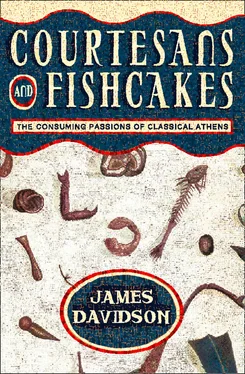Athenaeus’ talks of ‘gentlemanly’ or ‘liberal’ ( eleutherion ) behaviour, and this emphasis on class (in its broadest sense) also finds echoes in earlier literature. Alexis makes the statement that ‘no man who is a wine-lover can be of low character ( kakos ). For twice-mothered Bromius [Dionysus] doesn’t enjoy the company of coarse men and a life of no refinement.’ A similar sentiment is found expressed at the beginning of Wasps where the audience is trying to guess the nature of jury-loving Philocleon’s vice. One suggests he is a wine-lover ( philopotēs ) and Xanthias replies, never, since that disease is a ‘disease of worthies’ ( chrēstōn ). Towards the end of the same play Philocleon’s sophisticated son Bdelycleon orders the slave to get dinner prepared so that they can get drunk. His low-class father objects that drinking leads to bashing-in of doors, violence and fines. ‘Not if you are in the company of gentlemen’ ( kaloi k’agathoi ), replies his son. At this point the audience is probably expecting something along the lines of Athenaeus’ remarks about how true gentlemen know how to moderate their drinking with the refinements of conversation, but Bdelycleon’s mind is running along a different track. There will be no less violence, but once all the damage has been caused, the gentlemen intercede with the victim for you, or you yourself come up with some witty story, one of Aesop’s amusing fables or some tale of old Sybaris which you learned in the symposium; and so you turn it into a laughing matter and he forgets about it and goes off. 24 Конец ознакомительного фрагмента. Текст предоставлен ООО «ЛитРес». Прочитайте эту книгу целиком, купив полную легальную версию на ЛитРес. Безопасно оплатить книгу можно банковской картой Visa, MasterCard, Maestro, со счета мобильного телефона, с платежного терминала, в салоне МТС или Связной, через PayPal, WebMoney, Яндекс.Деньги, QIWI Кошелек, бонусными картами или другим удобным Вам способом.
These remarks remind us that although the symposium has been treated as the classic context for drinking in Greek society as late as the fourth century, it carries over from the archaic period associations with the lifestyle of one particular group within society, the aristocracy and their emulators. As Oswyn Murray observes: ‘However much the fifth-century democracy might try to provide public dining-rooms and public occasions for feasting, the symposion remained largely a private and aristocratic preserve.’ The lingering connotations of elitism are quite clear in the final scenes of the Wasps , in the awkwardness with which an Athenian Everyman, a dikast, like Philocleon, approaches the symposium: ‘to the fifth-century Athenian audience, the symposion is an alien world of licence and misbehaviour. ‘ 25 Конец ознакомительного фрагмента. Текст предоставлен ООО «ЛитРес». Прочитайте эту книгу целиком, купив полную легальную версию на ЛитРес. Безопасно оплатить книгу можно банковской картой Visa, MasterCard, Maestro, со счета мобильного телефона, с платежного терминала, в салоне МТС или Связной, через PayPal, WebMoney, Яндекс.Деньги, QIWI Кошелек, бонусными картами или другим удобным Вам способом.
Those beyond the aristocratic pale had to get their liquid refreshment elsewhere, in the tavern or kapēleion , a far more demotic and promiscuous space than the private and selective andrōn . This well-attested institution does not seem to have been given as much scholarly attention as it deserves. After the reference-filled columns of Hug’s brief entry in Pauly-Wissowa’s panoramic encyclopedia of the ancient world, it is hard to find any detailed study and few bother even to refer to it. To some extent this neglect is a direct result of the prominence accorded the symposium and the anthropological model of commensality in accounts of Greek drinking. In contrast to the symposium, the kapēleion looks out of historical place, foreshadowing the consumerized, individualized drinking which ought to be the prerogative of modern times. In addition there are some philological questions that sometimes cause problems. A kapēlos can be both a retailer in general and a taverner in particular, although in comedy and oratory, when it is used without qualification, the latter sense can almost always be assumed. 26 Конец ознакомительного фрагмента. Текст предоставлен ООО «ЛитРес». Прочитайте эту книгу целиком, купив полную легальную версию на ЛитРес. Безопасно оплатить книгу можно банковской картой Visa, MasterCard, Maestro, со счета мобильного телефона, с платежного терминала, в салоне МТС или Связной, через PayPal, WebMoney, Яндекс.Деньги, QIWI Кошелек, бонусными картами или другим удобным Вам способом.
These taverners seem to have sold wine, vinegar and torches to light the way home at night and offer protection from cloak-snatchers . In some of these establishments, it seems, you could have something to eat as well. The kapēloi began as wholesalers and continued to sell wine in bulk to those who could afford to entertain at home. But they also broke the bulk, a practice known as ‘half-pinting’ ( kotulizein ), and served smaller quantities of wine with water to be drunk on the premises. In Gorgias Plato mentions one particular kapēlos , called Sarambus, whose skill at ‘preparing’ ( paraskeuazōri ) wine he compares with the work of Athens’ finest baker and Mithaecus, a Syracusan cook, reputed to be the Pheidias of the kitchen. Some translators treat Sarambus as simply a seller of wine, and translate ‘prepare’ as ‘provide’, but the fact that he is put alongside creative characters like a baker and a chef suggests that Sarambus is more than a simple retailer. Plato is talking of his skills as a taverner, and in fact it is precisely this passage that the lexicographer Pollux uses to demonstrate that in classical Attica kapēloi also mixed the wine. Plato, he says, is praising Sarambus for his oinourgia , his ‘winesmanship’. What the oinourgia of a good taverner consisted of in actual fact is open to speculation; honest measures of good wine, perhaps, from an amphora not long opened, strained of debris, blended with clean, chilled water, maybe a little perfume, served in fine cups with some bar-food, some tragémata (desserts) perhaps or hales (savouries) as an accompaniment. There is evidence for the suppression of such establishments in Thasos at least and we don’t hear much of taverns before Aristophanes, but in his comedies they appear as an already well-worn feature of the urban environment and it would be dangerous to argue from silence that taverns were a late-fifth-century phenomenon, supplanting the older more traditional aristocratic symposia as the fourth century progressed. The two institutions of drinking continued to exist side by side for a long time and they had probably coexisted for some years before they turn up in our sources.
Читать дальше












